- Home
- Jasper Fforde
Shades of Grey Page 14
Shades of Grey Read online
Page 14
The directness of my question caught her off guard, but she soon recovered.
“Probably not, but I should hope the Greys under them will—and that my ancestors will have the wisdom to listen.”
“The sheep needs the shepherd, and the shepherd needs the sheep,” I replied, slipping into the Word of Munsell almost without thinking. “Apart We Are Together. There has to be some kind of hierarchy. The Purples aren’t lofty and superior because they’re Purple; it’s because they’re in power. You think Greys would be any different if the roles were reversed?”
“I don’t want Greys in power any more than I want the Yellows. I just think that everyone should be equal. Equal merits, equal Rules, equal standing within the village. Purple head prefect one year, Grey head prefect the next—or even no head prefect at all.”
“Equality is a proven myth,” I remarked, the well-worn arguments tripping off my tongue. “Do you favor a return to the ways of the Previous with their destructive myopia and Worship of the Me? Or simply a descent into the anarchic savagery of the Riffraff?”
“Despite what you read in Munsell, those aren’t the only choices. We deserve better that this. All of us. We could run the village like we run the Greyzone. No spots, no rankings, just people. Why do I have to prove myself an upright member of society and deserving of full residency before being allowed to marry? Why do I have to apply for an egg chit? Why can’t I move to Cobalt if I wish? Why do I have to submit myself to any of the Rules?”
“Because Something Happened.”
“What?”
There was no clear or easy answer to this.
“Something . . . best forgotten. You may hate living under Munsell, but it has sustained for almost five centuries. Besides, your wholly demeritable thoughts and conduct place you firmly in the minority.”
She leaned closer.
“You say that, but am I really in the minority?”
I opened my mouth to answer, but couldn’t. Since visiting the library I had pondered upon the usually unassailable wisdom of the Leapbacks. What was in The Little Engine That Could that might cause a damaging rift in society? What was so wrong with the telephone that it had to be withdrawn? Why was Mr. Simply Red no longer listened to? Why no more crinkle-cut chips, bicycles, kites, zips, yo-yos, banjos and marzipan? But I had paused, and that was enough for her.
“I don’t need you to agree with me,” she said quietly. “I’ll go away happy with a little bit of doubt. Doubt is good. It’s an emotion we can build on. Perhaps if we feed it with curiosity it will blossom into something useful, like suspicion—and action.”
She stared at me for a moment.
“But that’s not really your thing, is it?”
And she left me alone in the kitchen with my thoughts. They were confused mostly, but I was at least glad my long-held doubts finally had a use—it made Jane happy.
The East Carmine Marriage Market
1.1.2.02.03.15: Marriage is an honorable estate and should not be used simply as an excuse for legal intercourse.
I followed the rays of the setting sun out of the village along West Street, and sat on a bench to draft my telegram to Constance. Neither the nonadventure with the Last Rabbit nor the Oz Memorial nor the disgraced Yellow postman would actually impress, and mentioning Jane’s odd view of the Collective would be anathema. Constance had confided before I left that the things she looked for most in a husband were “incurious unambition” and “an ability to follow orders,” so I composed the telegram along the lines of how much I wanted to discharge my Civil Obligation to the Collective in the most productive manner, and how I thought of her all the time. I tried a poem:Oh, Constance Oxblood, my heart in full flood gushes, torrentlike, over rainburst stream and scrub. Prove to you that I’m no dud. dud? Bud cud stud
It wasn’t working. I was going to have to outsource my romantic thoughts to someone who could actually write poetry. I put my notebook away and gazed at the sun, which had just begun to dip below the Western Hills. The light was dropping fast, and the slopes were now black and shapeless in the lee of the daylight. It was the start of the gloaming, the transitional period between seen and unseen.
It was about the time, in fact, that the janitor would strike the arc. As if on cue, there was a bright flicker from behind me as the streetlamp burst into life, bathing the center of the town in strong artificial light. It was not just a way of extending the day but also a signal that any residents still out and about should think about returning. I could see the roof mirrors of the village swing around to pick up the light so that the beam splitters, Luxfer prisms and intensifiers that brought interior light during the day could service the village at night.
When I was a kid, we used to play dusk running, where the last one back to the safety of the streetlight was the winner. It was usually either Richard or Lizzie, but one evening it was decided that a champion dusk runner must be established, so they both went and stood in the center of the playing field and waited for the night to roll in. The rest of us stood expectantly in the town square, exchanging wagers and giggling. The first to funk out was the loser, the last one back the winner. Lizzie was first in, but Richard wasn’t the winner. He was found eight months later a mile beyond the Outer Markers by Greys on coppicing duty. He was identified only by his spoon; his postcode was reallocated a day later. No one tried dusk running after that.
Within a few minutes the river, stockwall and linoleum factory had all vanished, swallowed up in the rolling wall of darkness that was sweeping across the land. I abandoned my seat when the shadows became empty holes in my vision and retreated to the safety of the town square. The streetlamp was now burning brightly, the low hiss of the arc and the occasional squeak and flicker working to dispel the fear of the night. Behind me, only the crackletrap atop the flak tower could still be seen, and that only as a silhouette against the rapidly darkening sky.
“Hello!” said Tommo as he walked up. “I’ve been looking for you.”
I returned his salutation and thanked him for fixing up the Rusty Hill gig.
“Not a problem. Did you double-order the Lincoln for us, by the way?”
“A bit of a snag, I’m afraid.”
“Don’t be afraid,” said Tommo, “or at least, not of me. Courtland once beat Jim-Bob so hard he had blood in his wee.”
“I’ll get the Lincoln for you somehow.”
“I know you will. More important, are you going to marry my sister?”
I would have to get used to how quickly Tommo could change the subject.
“I didn’t even know you had a sister.”
“A state of affairs I am at efforts to maintain.”
“You’ve lost me.”
“It’s pretty simple. You’re a Red of moderate perception and the son of a swatchman. The fine, upstanding Red womenfolk of this cesspool will be fighting over your plums like dogs about a freshly dead carcass.”
“Graphically put, if also a little disgusting. But I’m sorry, I’m on a half promise to an Oxblood.”
Tommo raised his eyebrows. Not much impressed him, but this did. I explained about how my potential union to the Oxblood family would be my ticket to the easy life. We would be jointly running the family stringworks come Josiah Oxblood’s retirement, and it was well known that the Oxbloods were pretty much rolling in moolah.
“They have three permanent servants and a Leapback-compliant gyrocar,” I boasted, “and eat colorized food as a matter of course.”
“They’re also notoriously Redcentric,” he murmured.
This was true, too. Countless generations of Oxbloods had been choosing their mates wisely, and it was rumored that, paired with a suitably high-Redceptor husband, Constance might produce offspring who would surpass the Redness of the Crimsons, and topple them from the Red prefecture.
“Are you anywhere near the front of the queue,” asked Tommo, “or just a sad wannabe? Put it this way: Do you have pet names for each other?”
“We’ve shortlisted a few possibilities, but nothing’s fixed.”
Constance’s opinions on the matter, sadly, were entirely conservative. She had thought my suggestion of “snootchy bear” as an endearment a tad risqué, was tempted with a more traditional “dear” or “honey” and had conceded to a tentative “honey bear” as a compromise, but only in private.
“The union is not quite as inevitable as I make out,” I confessed. “Standing between me and a supremely rosy future is a po-faced slack-jaw named Roger Maroon.”
“A Maroon?” said Tommo. “I’d duck out now while you still have your dignity.”
“Don’t get me wrong,” I said quickly. “She’s quite affable in spite of her choosy Redcentric fickleness, and our courting has not been without a few moments. She has allowed me on several occasions to take her to a tea dance.”
“How scandalously forward of you. Have you tangoed?”
“Not yet,” I said slowly, “but we’re almost there.”
Actually, Constance had refused me a tango on the grounds that it was a “gateway dance” to something bolder, such as a lambada. If we’d done that, Old Man Magenta would have insisted we marry in order not to further offend public decency.
“Sadly,” I continued, “she’s also danced with Roger.”
“Looks like she’s hedging her ballroom bets as wisely as her bedroom ones.”
“I suppose so.”
“It’s all academic anyway,” said Tommo with a laugh. “Once you get to know the fillies in this village, all notions of running the family stringworks will vanish like thistledown in a nor’easter.”
“I’m not staying, Tommo.”
“Well, let’s just pretend you decide to take up residence. C’mon, Eddie, run with me on this one.”
&
nbsp; “Okay,” I said with a sigh. “Let’s hear it.”
“Excellent!” he cried, clapping his hands together. “Here’s how I see your wedding prospects in this glorious sinkhole of ours: Since you look like too bright a fellow to dilute your color with anything other than the good old House of R., your choices among the Red crumpet in the village are, to say the least, limited. Once you subtract all the Greys, men and other hues from the three thousand or so people living here, there are one hundred and twenty-five potential Red womenfolk. You do the sums. Thirty-nine are already married, fourteen are widowed and nineteen have partners off at Reboot. Seventeen are spinsters over the age of fifty, and twenty-eight are under sixteen. How many left?”
“Nine.”
“Right. Up for their Ishihara this year and thus available for nuptials are my sister Francesca, Daisy Crimson, Lisa Scarlet and Lucy Ochre. If those don’t suit, Rose Madder, Cassie Flamingo and Jennifer Cochineal will be up for their Ishihara next year. If you feel like putting a spinster out of her misery, still on the prowl are Tabitha Auburn and Simone Russo.”
“Hmm,” I mused, half in jest, “no Blues you can think of for me to start a Purple dynasty with?”
He shook his head.
“DeMauve and the Council would never allow it. But if you’re considering abandoning your birth hue, Violet deMauve is still available. She’s in need of some Red seed to bring the deMauves back to mid-Purple rather than the Bluey-Red they are at present. But you’d have to be so utterly, utterly desperate for social advancement you’d be willing to ignore the fact that she’s the most poisonous female in the village.”
“I thought you said that accolade belonged to Bunty McMustard?”
“I think they’re on some sort of rotation. In any event, I decided in your best interests to leave Violet deMauve out of the equation. Unless, of course, you want to spend the rest of your life being told what to do and when to do it?”
I thought about Constance. There was, I had to admit, something of a similarity. “In your own stupid pretend world, no, I wouldn’t fancy that.”
“I agree. You’d have to be insane to marry into the nest of vipers. The only other girl off-limits is Lucy Ochre. She’s reserved.”
“Reserved?”
“For me. So paws off.”
“Does she know this?”
Tommo shrugged. “Not really.”
“Eight is still a pretty good choice.”
“Not quite right,” he replied, counting off my potential choices on his fingers. “Simone Russo is the low-percepting product of the head plumber and a Grey—quite unsuitable. Rose Madder is on a promise, and Lisa as good as. Tabitha is on a half promise to Lloyd Bluto. Lisa Scarlet is a bit low on the social scale, what with her father being sent off to Reboot. Cassie is hideously weird, and Jennifer declared herself last week with a Grey named Chloe.”
“Ah.”
“So that leaves my sister Fran and Daisy Crimson.”
“Choice of two? Generous of you, Tommo.”
“Not so fast. Since I’ll thump you painfully between the eyes if you even think about placing any part of your grubby person on my dear Francesca, whom I’ve sworn to protect from all life’s unpleasantness, I’m afraid that leaves only Daisy Crimson. I hope you’re very happy together.”
“You’ve got this all worked out, haven’t you?”
“I think of little else.”
While we had been talking, every last vestige of natural light had vanished. The sky was like ebony, and the only illumination was the harsh white light of the central streetlamp, which cast shadows so hard it seemed you might cut yourself on them. Just as I was telling Tommo what complete rubbish his fantasy marriage league was, a figure dressed in an overcoat and carrying a valise walked out of a nearby house. I didn’t realize the figure was Travis Canary until he was quite close.
“Hullo!” he said when he saw me. “How are you settling in?”
“Pretty well,” I replied. “Have you met Tommo?”
They shook hands, and Tommo looked at the Yellow suspiciously.
“You’re not wearing your spot,” he said.
“I’m not going to need one where I’m going.”
I thought he meant Reboot, but he didn’t. Before we could say anything more, he tipped his hat and walked into the night. In a few seconds the darkness had swallowed him up, and he was gone.
Tommo and I could hardly believe what we had just witnessed, and stared at each other in astonishment. I looked around, but though the square still had a dozen or so people out for a nighttime perambulation, no one else had noticed.
I walked across to press the Nightloss alarm, but Tommo stopped me.
“Wait, wait, Eddie. He’s a Yellow—one less is no big deal. Besides, he’s up for Reboot, and more important, it’s nothing to do with us.”
“You never leave anyone out at night,” I retorted pompously, “not even a Yellow.”
I pressed the Nightloss alarm, and the klaxon sounded three shrill blasts.
The square was suddenly deathly quiet, and within a few seconds, empty. When there was a shout on, most people found something else to do and somewhere else to be. Nightloss was a sorry, tragic affair, and trying to rescue someone could have doubly tragic consequences. The custom was to not get involved—or at least, not until the morning, when the search took place. We walked to the limit of the falloff and peered into the darkness, which swirled like an angry black fog. We were right on the edge of the village. Beyond the houses to our left and right was only the lumpy grassland.
“Who’s out there?” came a voice.
It was Prefect Sally Gamboge, and she looked as though I had interrupted her dinner. I explained that it was Travis Canary who had just walked out, and she looked at me with an expression of supreme indifference. “Reboot or Nightloss,” she said, “it’s all the same to us. Isn’t that right, Tommo?”
“Yes, ma’am.”
“But he’s Yellow,” I persisted.
“In color, but not in spirit,” she replied. “His selflessness just saved us a train fare out of here, so in that respect we should be grateful.”
“So you’re not going to do anything?”
She looked at me, and her eyes flashed dangerously. “No.”
And without giving me another look, she walked back toward her house.
I stood there, staring into the darkness. He had been Rebooted only for his attempt to improve things, and despite Travis’ flawed hue, he had offered a friendship, and I had accepted it.
I opened the cabinet below the Nightloss button. The reel of string and the belt clips were there, but the emergency Daylighter magnesium flare was missing. I looked into the darkness and tried to visualize where Travis might be. Although I couldn’t see anything, the road in front of me led past the flak tower, through the empty grassland, past the bridge and, beyond that, to the linoleum factory.
And then I heard him. A series of short cries as the night terrors began to take hold. No one was immune, not even the wisest prefect or sagest Colorman. We all knew what it was like—even indoors the absence of light has an effect upon the senses that brought forth a multitude of terrifying apparitions. But only if you panicked, and let the terror get a hold. Once you were in the grip of a night terror, it would take nerves of steel to get you out.
Without thinking, I slipped off my shoes and socks and felt the warmth of the Perpetulite on my feet. If I didn’t stray from the roadway, I would have nothing to fear.
“What are you doing?” asked Tommo, as surprised as I was by my actions.
“He sounds like he’s at the Faraday cage,” I replied, attaching the clip to my belt, looping the string around it and handing him the reel. “I’ll be back in a jiffy.”
“Without a flare? Wait—”
But I ignored him and stepped forward into the wall of darkness. Although I was initially without panic, after thirty paces or so the enormity of what I was doing caught up with me, and I suddenly felt my chest tighten and my mouth go dry as the swirling darkness started to heap into shapes. I could tell the onset of a night terror, and from long practice simply closed my eyes and breathed deeply until the panic subsided. It didn’t help that Travis gave out the occasional cry. Annoyingly, though, he hadn’t stopped walking, and his cries were becoming fainter by the minute. After I had walked fifty yards or so and kept to the road by the feeling of the smoother and colder central white line beneath my feet, I heard the Nightloss siren sound again, which was unusual in the extreme—some other fool must have gotten himself lost on the other side of the village.

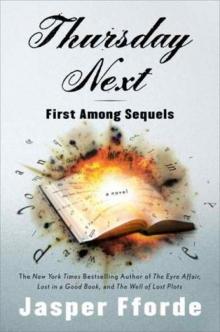 First Among Sequels
First Among Sequels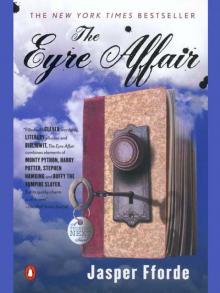 The Eyre Affair
The Eyre Affair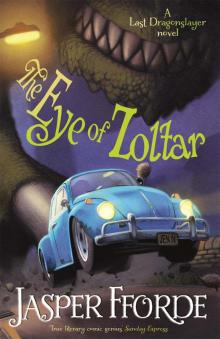 The Eye of Zoltar
The Eye of Zoltar The Woman Who Died a Lot
The Woman Who Died a Lot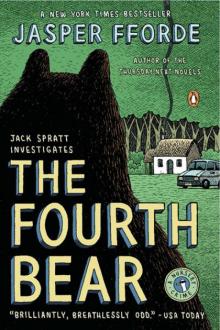 The Fourth Bear
The Fourth Bear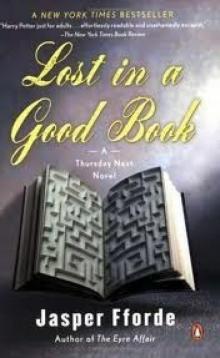 Lost in a Good Book
Lost in a Good Book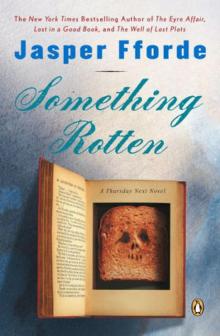 Something Rotten
Something Rotten The Well of Lost Plots
The Well of Lost Plots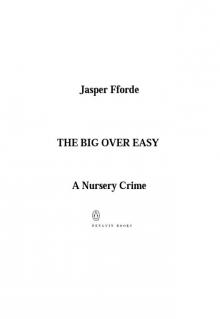 The Big Over Easy
The Big Over Easy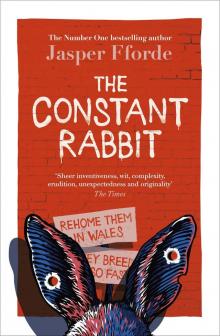 The Constant Rabbit
The Constant Rabbit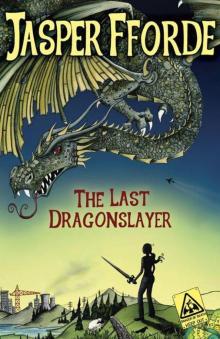 The Last Dragonslayer
The Last Dragonslayer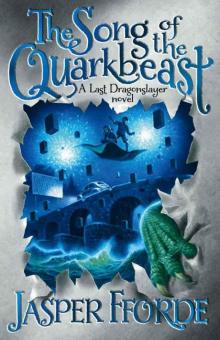 The Song of the Quarkbeast
The Song of the Quarkbeast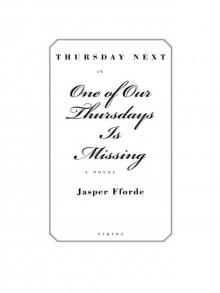 One of Our Thursdays Is Missing
One of Our Thursdays Is Missing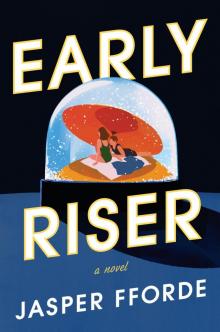 Early Riser
Early Riser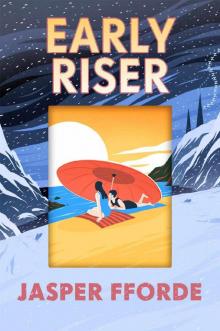 Early Riser_The new standalone novel from the Number One bestselling author
Early Riser_The new standalone novel from the Number One bestselling author Something rotten n-4
Something rotten n-4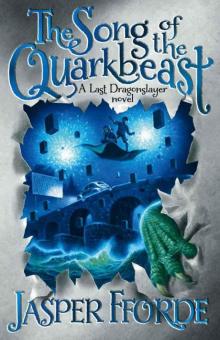 The Song of the Quarkbeast tld-2
The Song of the Quarkbeast tld-2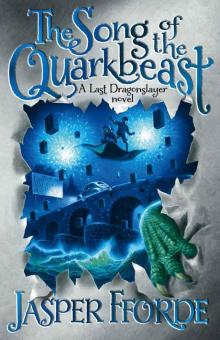 The Song of the Quarkbeast: Last Dragonslayer: Book Two
The Song of the Quarkbeast: Last Dragonslayer: Book Two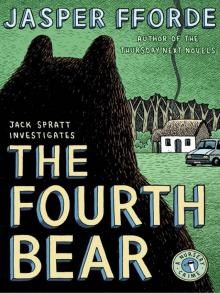 The Fourth Bear nc-2
The Fourth Bear nc-2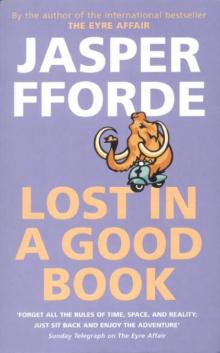 Lost in a Good Book tn-2
Lost in a Good Book tn-2 The Well of Lost Plots n-3
The Well of Lost Plots n-3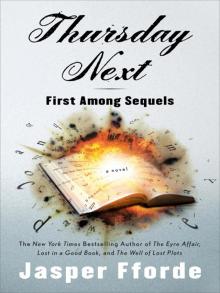 Thursday Next in First Among Sequels
Thursday Next in First Among Sequels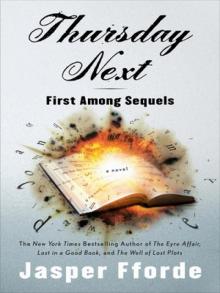 First Among Sequels tn-5
First Among Sequels tn-5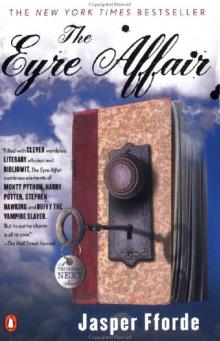 The Eyre Affair tn-1
The Eyre Affair tn-1